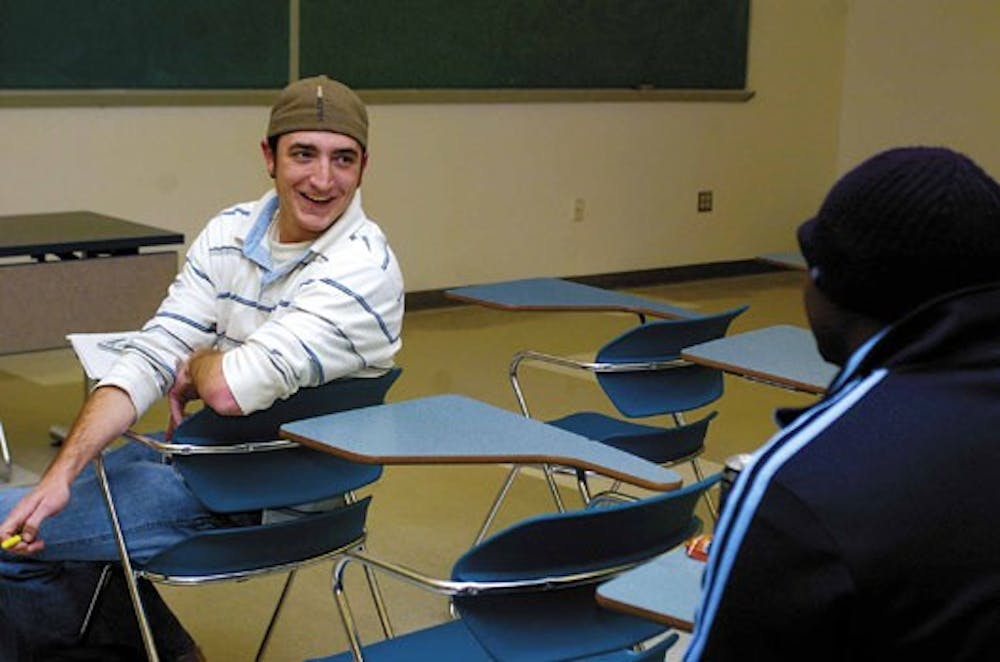by Joshua Curtis
Daily Lobo
Student Ben Mills was at boot camp when the terrorist attacks on Sept. 11, 2001, happened.
"We were all in there and kind of cut off from the world for 20-some days. The instructors came in and asked if anyone had family in D.C. or New York. We didn't have any clue what it was," he said. "One of the chaplains came in and told us what happened, and they showed us footage for about 10 minutes."
Mills said it was hard to deal with because they were so isolated at camp.
Get content from The Daily Lobo delivered to your inbox
"Everyone was pretty shook up by it," he said. "We didn't really get the full understanding of what had happened."
Mills, a double major in political science and economics, is one of 568 self-declared veterans at UNM who notify the University's Veterans Affairs office that they are
enrolled in classes, said Louis Adams, a representative of the office. There are about 150 undeclared veterans who attend UNM without informing the office, Adams said.
Mills joined the Navy without any preconceived ideas of the military, he said. He joined just because he wanted to.
He served on unarmed military transport boats and was part of a security team that outfitted the unarmed boats with large arsenals to deter Somalian pirates. His job was to keep cargo safe so it would make it to Kuwait, where it would be taken to Iraq in convoys.
"I got in and I loved it," he said. "I almost re-enlisted but decided to get out and use my GI Bill."
Jeremy Aranda, an art education major, joined the Army in November 2001 in hopes of preventing future attacks like those on Sept. 11.
"When I joined, we were just getting into it, so I didn't have too much of an opinion except we got to get them (terrorists)," he said.
Aranda worked as a mechanic for ground vehicles and traveled with convoys in Iraq.
His job was to maintain Humvees and large transport trucks called deuce-and-a-halves.
Nicole Davidson joined the military reserves in January 2002. She said the Sept. 11 attacks had nothing to do with her motive for joining. She wanted to have a job, gain some experience and learn to be more efficient in her daily life.
"I went to training from May of that year until December," she said. "January 2003, I got activated, and then I was sent to El Paso. Then I was deployed to Kandhar, Afghanistan. I was only overseas for six months."
Davidson's job was to make sure the troops received the fuel they needed.
Mills, Aranda and Davidson's service left them with money for school through the GI Bill and an appreciation for the chance to attend college.
Davidson uses the GI Bill to pay for her double major in biology and chemistry.
"I was declared independent for financial aid and I have the GI Bill. I could be deployed - that's actually more stressful than anything," she said. "I think the military is generally a good experience, but I don't think it is for everyone."
Aranda has a different story. He is being recalled to Iraq for service before the semester ends.
"I am cool with it. I got out (of the military) with the attitude that if God wants me in, he will call me in," he said. "I know what to expect; last time it was good."
Aranda's experience is going to be different this time, because he will be supervising other soldiers.
"I got sergeant four months before I got out and was in charge of guys," he said. "I don't know what is going to happen now. I have to be a boss. I was pretty fortunate. I had a good example of how to do things. I have responsibilities - other people."
Aranda said he is frustrated with other students who don't understand the complexity of the issues in Iraq.
"In some of these classes, I had an 18-year-old say that Bush is stupid, and we don't need to be out there. But then you just got to think, he is just a kid and he doesn't know what he is talking about," he said.
Mills said he understands why people don't agree with the war and supports their right to disagree. He doesn't agree with everything the government does, but that drives him to change it, not rail against it, he said.
"As far as people doing something to change things, protesting is one way to do it, but go vote," he said. "My unit always made sure we got our absentee ballots in on time. People who are here can go and do it - even if you don't like the candidates."
Mills said protesting does little compared to volunteering for political campaigns and voting.
"There are some people who seem so pissed off at how the government works," he said. "Instead of majoring in philosophy and thinking all day, get a job and make a difference."
Mills said he doesn't think the troops should suffer because of lack of support for the war.
There are ways to support the troops without supporting the war, such as donating to the Red Cross, he said.
"There is so much more to it," he said. "There is a huge difference between supporting the troops and supporting the war. I could care less if you support the war. The 18- to 25-year-old kids aren't the ones making the decisions."
The problem is not differing views, but people who are not willing to do something about what they believe in, Mills said.
"Don't go to a coffee shop and bitch about it living off of daddy's paycheck," he said. "Get up and do something about it."






